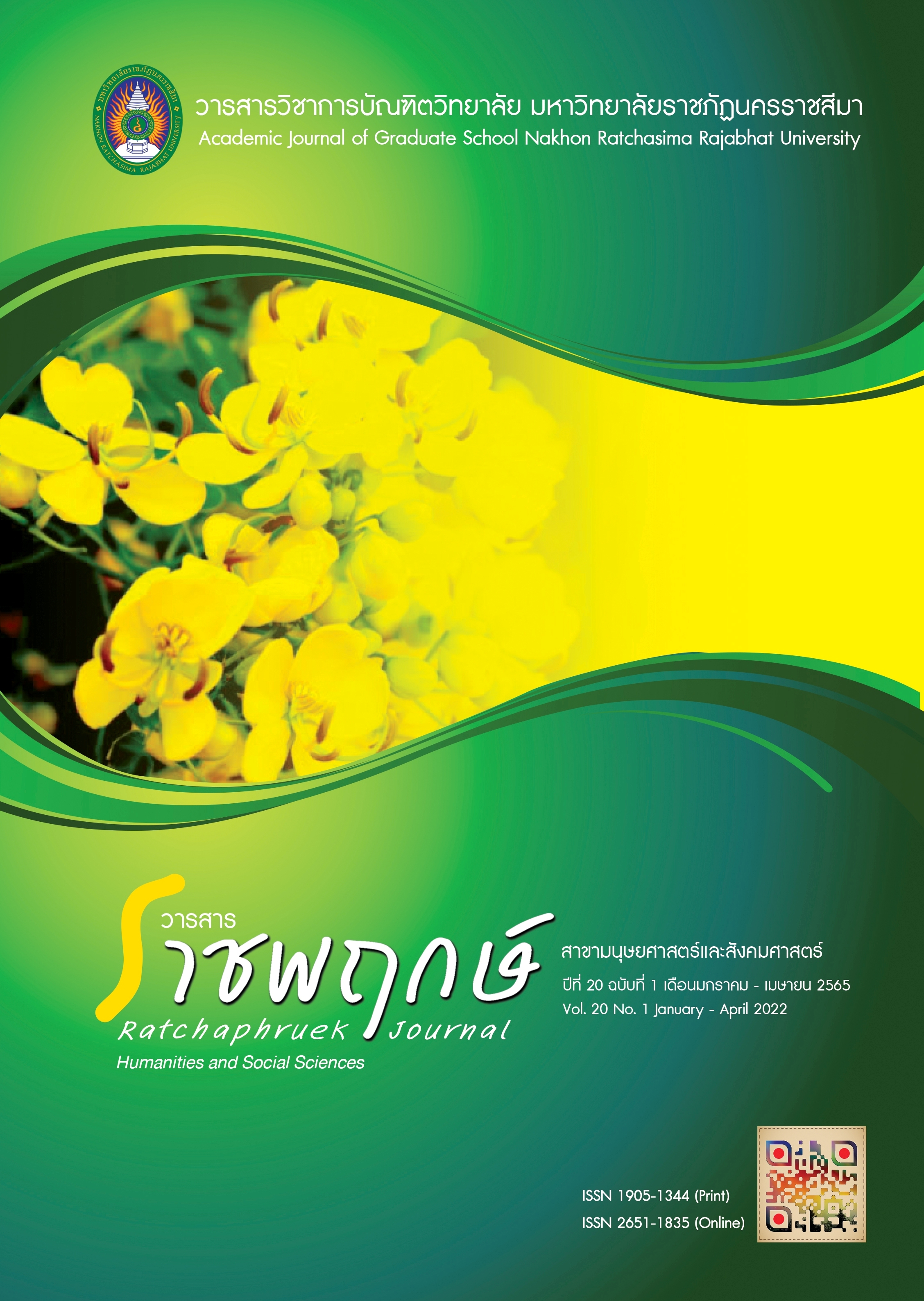The Effects of Integrated Group Counseling to Develop Inner Strength of Mathayom Suksa VI Students in a School in Bangkok
Main Article Content
Abstract
The objectives of this study were (1) to compare inner strength levels of an experimental group students before and after receiving integrated group counseling; and (2) to compare inner strength level of the experimental group students who received integrated group counseling with that of a control group students who received normal advice. The research sample consisted of 16 Mathayom Suksa VI students of a school in Bangkok Metropolis whose scores as assessed by an inner strength assessment scale were at the 25th percentile or lower. Then, they were randomly assigned into an experimental group and a control group each of which consisting of 8students. The experimental group received integrated group counseling for 10 sessions with 90 minutes in each session; while the control group received normal counseling. The employed instruments were (1) an integrated group counseling program to develop inner strength, and (2) an inner strength assessment scale with reliability coefficient of .85. Statistics employed for data analysis were the median, inter-quartile deviation, Wilcoxon matched-pairs signed-ranks test, and Mann-Whitney U test. The research findings showed that (1) after receiving the integrated group counseling, the experimental group students had inner strength higher than before with statistical significance at .01 level; and (2) after receiving the integrated group counseling, the experimental group students had inner strength higher of the control group students who received normal advice at .01 level of statistical significance.
Article Details

This work is licensed under a Creative Commons Attribution-NonCommercial-NoDerivatives 4.0 International License.
References
กระทรวงศึกษาธิการ, สำนักงานเลขาธิการสภาการศึกษา. (2562). รายงานการศึกษาไทย พ.ศ. 2561,กรุงเทพฯ: ผู้แต่ง.
พิทักษ์ สุพรรโณภาพ. (2560). การคิดเชิงบวกตัวแปรในการพัฒนาชีวิต ภาควิชาพื้นฐานทางการศึกษา คณะศึกษาศาสตร์ (รายงานผลการวิจัย). นครปฐม: มหาวิทยาลัยศิลปากร.
ภัทราภรณ์ พวงเพชร. (2561). การปรึกษาเชิงจิตวิทยาแบบกลุ่มบูรณาการเพื่อพัฒนาการตระหนักรู้ในตนเองของนักเรียนวัยรุ่นที่มีพฤติกรรมเสี่ยง (วิทยานิพนธ์มหาบัณฑิต, มหาวิทยาลัยเชียงใหม่).
รัชดา อรหันตา. (2557). ผลของโปรแกรมความคิดเชิงบวกที่มีต่อความเข้มแข็งทางจิตใจของนักเรียนชั้นมัธยมศึกษาปีที่ 3, สืบค้นเมื่อ 25 พฤษภาคม 2564, จากhttp://ednet.kku.ac.th/edujournal/index.php/EDGKKUJ/article/view/51002/42232
วัชรี ทรัพย์มี. (2558). เทคนิคการปรึกษาเบื้องต้น. กรุงเทพฯ: มหาวิทยาลัยสุโขทัยธรรมธิราช.
Chester, B. (1992). Women and political torture: Work with refugee survivors in Exile. Women & Theory, 13(3), pp. 209-220.
Dingley, C., Roux, G., Bush, H. (2000). Inner strength: A concept analysis. Journal of Theory Construction and Testing, 4(2), pp. 30-35.
Hicdurmaz, D. & Oz, F. (2016). Interpersonal sensitivity, coping ways and automatic thoughts of nursing students before and after a cognitive-behavioral group counseling program. Journal of Nurse Education today. 36, pp. 152-158. doi: 10.1016/j.nedt. 2015. 09. 006.
Knapp, J. R., & Karabenick, S. A. (1985). Overcoming problems: The perceived importance of willpower and other contributors. Cognitive Theory & Research, 9(3), pp. 343-354.
Lewis, K. (2004). The Psychometric Properties of the Inner Strength Questionnaire for Women with Chronic Health Conditions. Virginia Commonwealth University. Richmond, Retrieved May 1, 2004, from https://core.ac.uk/download/pdf/51292130.pdf.
Lundman, B., Viglund, K., Alex, L., Jonsén, E., Norberg, A., Fischer, R. S., Nygren, B. (2011). Development and psychometric properties of the Inner Strength Scale. International Journal of Nursing Studies, 48(10), pp. 1266-1274.
Nakimuli-Mpungu, E.,Okello, J., Kinyanda, E., Alderman, S., Nakku, J., Alderman, J. S., Pavia, A., Adaku, A., Allden, K., & Musisi, S. (2013). The impact of group counseling on depression, post-traumatic stress and function outcomes A prospective comparison study in the Peter C. Alderman trauma clinics in northern Uganda. Journal of Affective Disorders, 151(1), pp. 78-84.
Rose, J. (1990). Psychological health of women: A phenomenologic study of women's inner strength. Advances in Nursing Science, 12(2), pp. 56-70.
Roux, G., Dingley, C., Bush, H. (2002).Inner strength in women: Met synthesis of qualitative findings in theory development. Journal of Theory Construction & Testing, 6(1), pp. 86-93.


